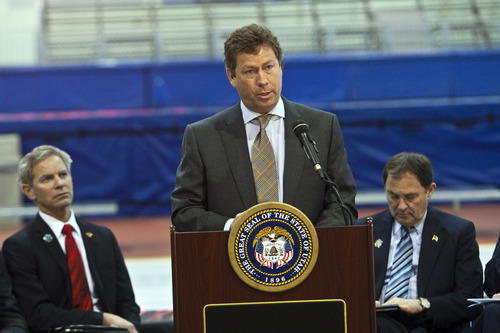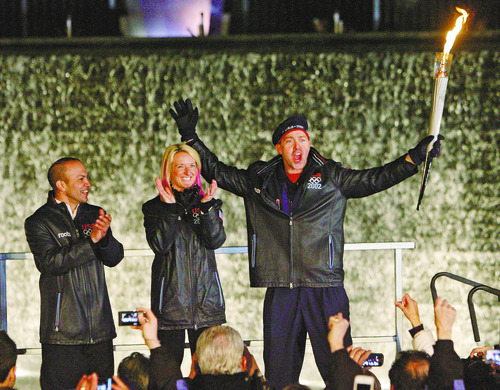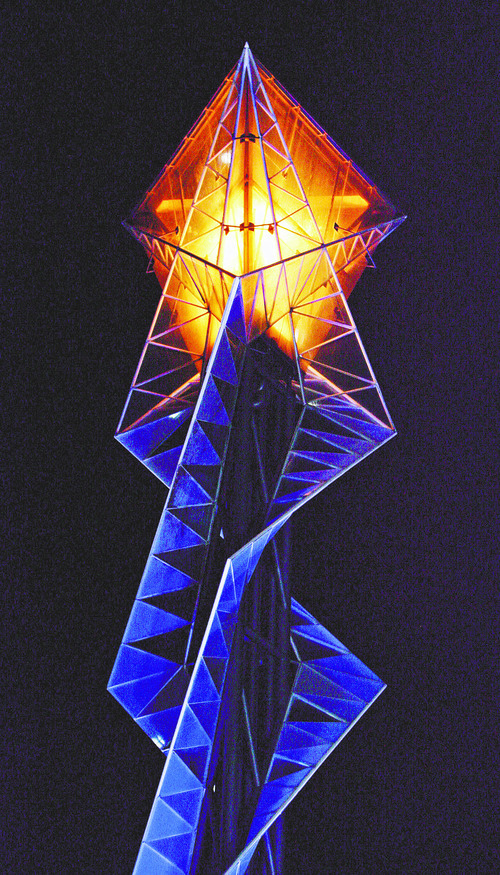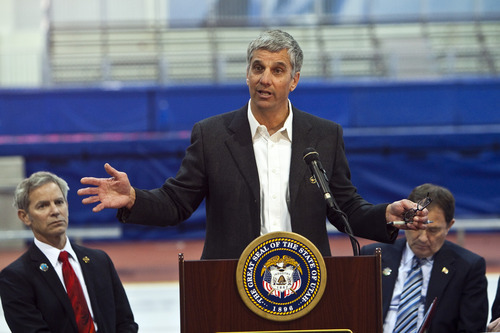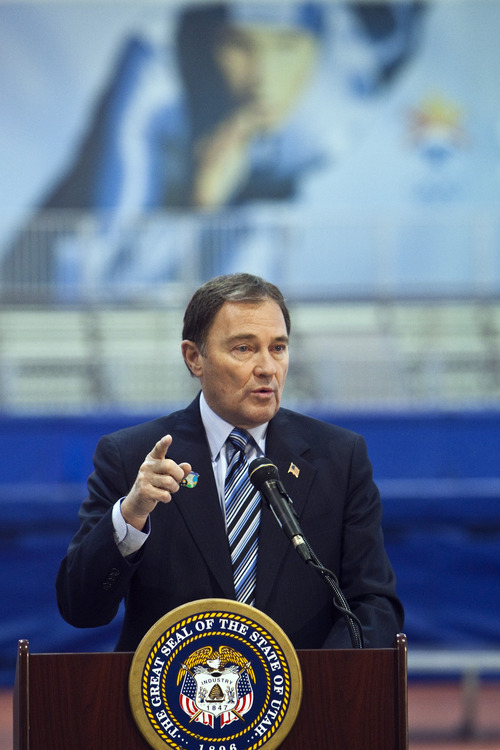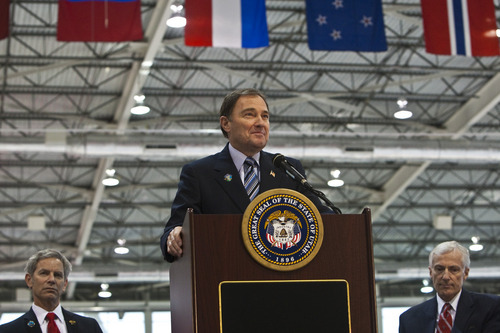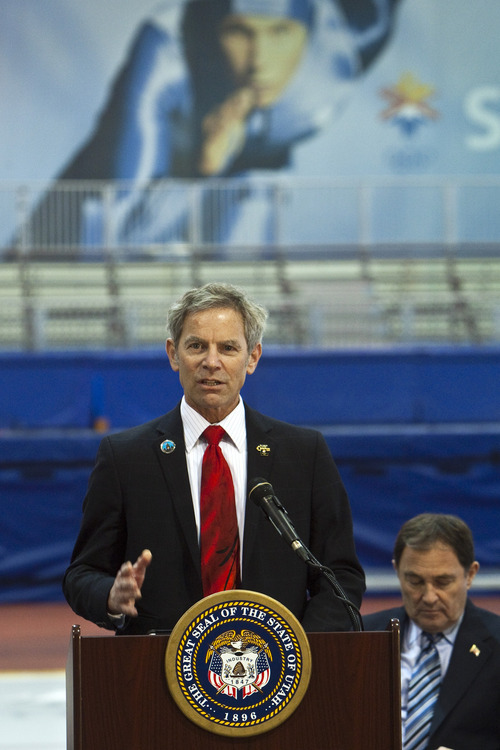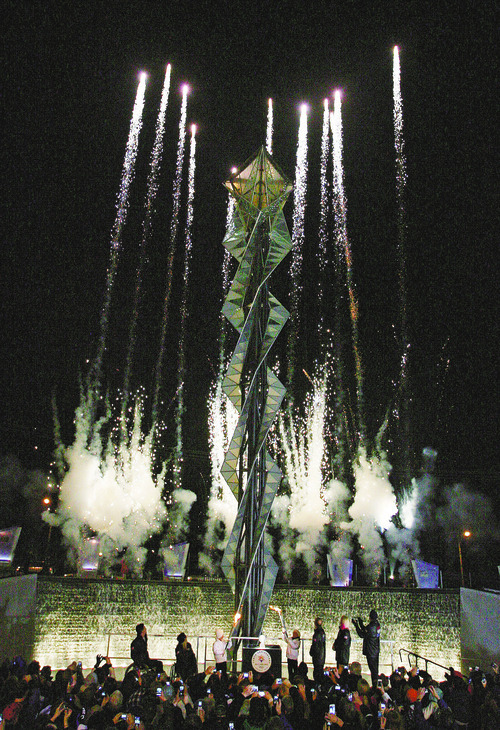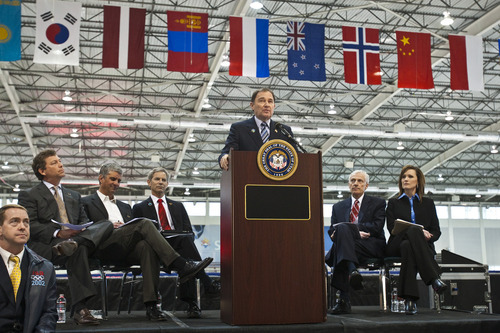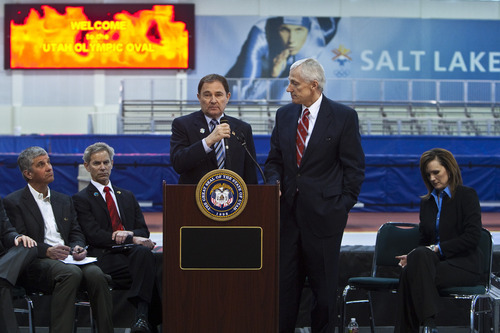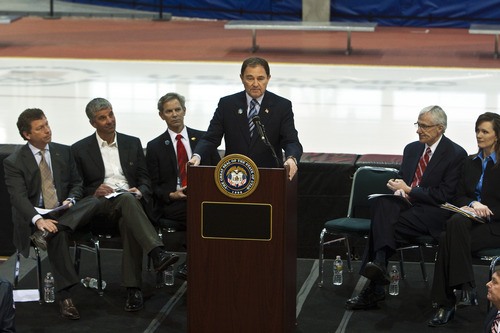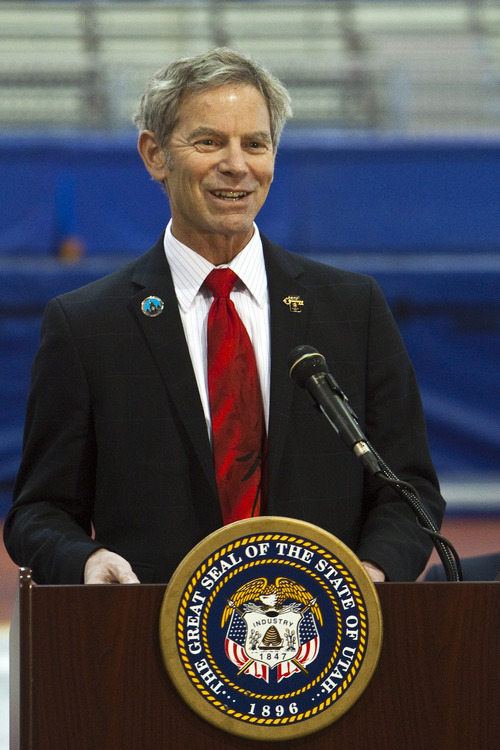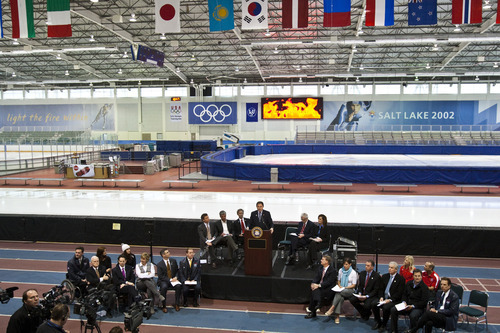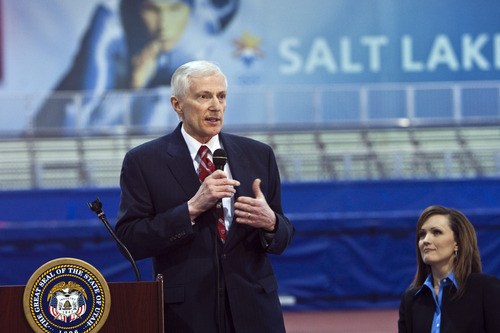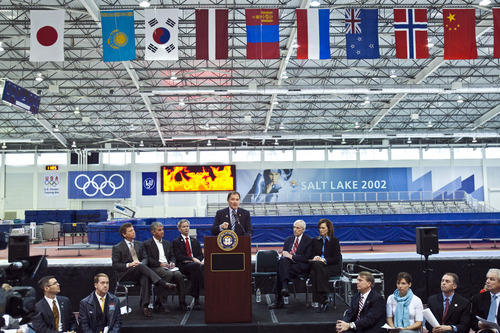This is an archived article that was published on sltrib.com in 2012, and information in the article may be outdated. It is provided only for personal research purposes and may not be reprinted.
It was a day for reveling in Utah's Olympic glory days of a decade past, and giving serious consideration to trying to do it again a decade hence.
Although it balked mightily, the Olympic caldron at Rice-Eccles Stadium was relit for a few minutes Wednesday evening — the 10th anniversary of the start of the highly successful 2002 Winter Games.
Lingering sparks of enthusiasm from that transcendent time had been evident hours earlier Wednesday at the Utah Olympic Oval in Kearns, where Gov. Gary Herbert and Salt Lake City Mayor Ralph Becker, hailing the many accomplishments of those 17 days, announced the creation of an exploratory committee to see whether Utah should put together a formal bid for the 2022 or 2026 Winter Olympics.
When Herbert told hundreds of spectators at the caldron relighting of that plan, it set off the second loudest cheer of the evening. "I appreciate your enthusiasm," he shouted, promising to relay this show of support to the exploratory committee, acknowledging, "I think they share your enthusiasm."
Eric Heiden certainly does.
"I vote yes," said Heiden, winner of five gold medals at the Lake Placid Olympics, even before the committee begins its exploration into bid costs, private sector and public support, venue and infrastructure needs, potential U.S. competition (Denver and Reno-Tahoe) and impacts on the environment and transportation systems.
He said the 2002 Olympics showed Utah is ideally suited for the Winter Games, then and now. The speedskating oval still has the fastest ice on Earth "and the other venues have viable, well-used programs for aspiring young athletes," Heiden added. "Athletes want to go somewhere where they have the best chance to compete.
"This community is special," he added, citing the way Utahns have embraced winter-sport athletes. "I'm a product of being introduced to Utah in 2002. I moved here four years later. Athletes are here because of what the people of Utah, and Utah in general, have to offer."
There's no doubt Utah can put on a great Olympics, Herbert said. 2002 proved that. But should the state try again?
"We need to pursue this [exploration] to see if there is real opportunity there," Herbert said, asking the 14-member committee to deliver a comprehensive report by May. "This is just the first step of the process. But it's an exciting step that needs to be taken if we are going to take the journey."
While Becker emphasized that "no predetermined recommendation" is expected from the committee, he made it clear he believes Salt Lake City and Utah's other 2002 venue cities have existing foundations to put on a "sustainable" Olympics. After all, much of the venue infrastructure is in place, the airport is as close as it ever was to the city and the mountains, and the mass transit system will be far more far-reaching than it was in 2002.
Former Salt Lake Organizing Committee boss Mitt Romney even took time away from his heated Republican presidential campaign to weigh in on the idea. "I'm delighted that Utah is thinking about bidding for the 2022 Winter Olympics," he said. "Our great nation is wonderfully suited to host the world's greatest sporting competition."
The last time Salt Lake City was in the hunt for the Olympics, some of Utah's largest businesses and other private donors spent several million dollars to promote the city's bid for, first, the 1998 Winter Games (which went to Nagano, Japan) and then 2002.
After Salt Lake City secured the 2002 Games in 1995, the Salt Lake Organizing Committee pledged to repay the $59 million Utah taxpayers had invested to build a speedskating oval and a complex of ski jumps and a bobsled/luge track as indicators to the International Olympic Committee of this area's commitment to winter sports. Organizers also agreed to leave behind a $40 million endowment to run those facilities afterward.
When SLOC finished the 2002 Olympics and Paralympics with a $100 million surplus, that endowment grew to $76 million. Both facilities have operated steadily ever since and now have more active participation than ever.
The exploratory committee includes three Olympians (speedskaters Eric Heiden and Catherine Raney Norman, and skeleton racer Jim Shea), four former SLOC executives (Grant Thomas, Brett Hopkins, Colin Hilton and Spencer Eccles Jr.) and two other veterans of the 2002 Olympics (Lane Beattie and Jeff Robbins). The group will be led by Becker, Lt. Gov. Greg Bell and Steven Price, chairman of the Utah Sports Commission.
If the committee recommends pursuing another Games, Herbert said a broader-based bid committee would be formed. While he foresees a bid being privately financed, Bell added the committee would not rule out a public-private partnership.
At the flame relighting, news of another possible bid thrilled Janet Lucas, 54, who had volunteered at the Ogden Ice Sheet where curling was contested. "I'm hoping with all my heart for 2022 because I would do it all again — in a heartbeat," she said.
Lucas had been mildly disappointed when the flame failed to ignite as two "Children of Light" symbolically touched lit torches from Salt Lake's relay. She hung around for a few minutes after event organizer Fraser Bullock reluctantly told the crowd to go home, that the flame would not light. "Just coming together and seeing all the people again, it was worth it," Lucas was adding just as the caldron lighted with a pop, triggering the night's loudest ovation.
Melanie and John Dutcher were among those cheering, decked out in their volunteer jackets, yellow for event services. "We both want to volunteer again in 2022," she said. "To do it twice would be beyond imagination."
Chuck Spence doesn't think he'll get another chance to volunteer, like he did in '02 as a driver at IOC and NBC headquarters. After all, he's 81 now. But Spence is bullish on another Salt Lake Olympics.
"We did a wonderful job then and we'll do an even better job [in 2022] because of our experience," he said.
Twitter: @sltribmikeg
Tribune reporter Robert Gehrke contributed to this article —
Olympic Exploratory Committee
Utah Lt. Gov. Greg Bell • Lead co-chairman
Salt Lake City Mayor Ralph Becker • Co-chairman
J. Steven Price, founder of Price Realty Group and Utah Sports Commission chairman • Co-chairman
Lane Beattie • Salt Lake Chamber president/CEO and state Olympic officer in 2002
Spencer Eccles Jr. • Executive director of Governor's Office of Economic Development, venue leader at Snowbasin in 2002
Eric Heiden • Orthopedic surgeon practicing sports medicine in Park City, five-time gold medalist in speedskating
Colin Hilton • Utah Olympic Legacy Foundation president/CEO and SLOC employee in 2002
Brett Hopkins • CEO of Ken Garff Auto Group and SLOC's chief financial officer in 2002
Derek Miller • Gov. Gary Herbert's chief of staff
Catherine Raney Norman • Four-time Olympian now coaching the Park City Speed Skating Club
Jeff Robbins • Utah Sports Commission president/CEO and former state director of Olympic relations
Jim Shea • Third-generation Olympian who won a gold medal in skeleton in 2002 and lives in Park City
Jenni Smith • President and general manager of Park City Mountain Resort
Grant Thomas • SLOC's senior vice president for venues and transportation, overseer of City Creek Center construction project, infrastructure adviser to the International Olympic Committee
Source: Governor's Office 2022 bid timetable


